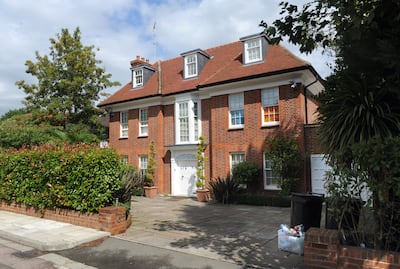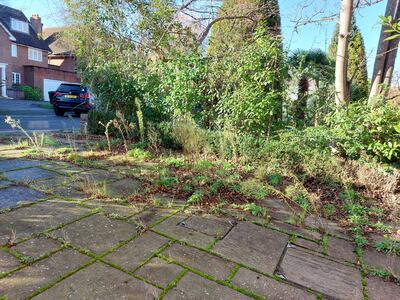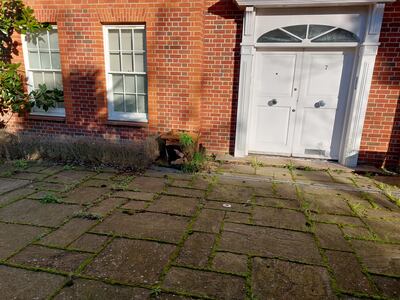The multi-million-pound London property once owned by the Qaddafi family has not aged well since it was seized in the name of the Libyan people a decade ago.
Invaded by protesters, fought over in the courts and then neglected by its new owners, the house at 7 Winnington Close has rubbish sacks dumped in the front garden and weeds sprouting from between the paving slabs.
The only residents for years, neighbours say, are rats and mice.
The house in a north London district favoured by Middle Eastern investors is a symbol of the hunt for assets looted by Muammar Qaddafi, his family and associates.
The seizure of the £9m ($12.1m) property in 2012 was heralded as the start of an assault on the looted overseas assets estimated at between $40 billion and $200bn.

But like the once desirable eight-bedroom house with its swimming pool and cinema room, the Libyan asset recovery effort is slowly falling apart.
There is precious little to show after a decade of infighting, power struggles, destroyed evidence and false trails.
Most of the records that detailed the looting by the Qaddafi family have been destroyed or lost, according to US court filings.
Officials in Libya have few records showing where the money has gone.
Insiders who knew about the mechanics of the corruption fled, were killed or imprisoned, while the country’s new leaders are ill-equipped and ill-prepared to chase looted assets.
The money was used to “grease the wheels of financial centres and real estate speculators around the world”, wrote London-based Libyan lawyer Mohamed Shaban, who was involved in the effort to seize the property at Winnington Close.
A 2016 study by consultants for anti-corruption charity Transparency International suggested that some $60bn to $120bn had been looted by former regime officials but only $20 million of that was returned to Libya.
Half of that was the Winnington Close property owned by Saadi Qaddafi, a son of the former leader and former commander of Libya's special forces.
Another $130m had been frozen, leaving the vast bulk unaccounted for. There has been little improvement in the following six years.
“There have been some assets recovered in some countries but not to the extent that we wish would have happened,” said Kinda Hattar, Middle East regional adviser for Transparency International.
“We have changed the heads of state, but we haven’t changed the systems.”
An attempt to reinvigorate the effort in 2021 with the “largest asset recovery case in history” in the US foundered within days of its launch because of a power battle between two men vying to lead the hunt for Qaddafi money.
US judge Barbara Moses ordered a halt to proceedings in January because of the dispute, ending efforts to trace “tens of billions” of dollars suspected to have passed through the US banking system.
The infighting within the Libyan Asset Recovery and Management Office (Larmo) was a particular blow as the organisation, established with the help of the UN and EU, was considered the best hope for recovering anything.
Previous efforts failed in part because of disputes between competing government agencies. Fraudsters stepped into the void.
Countries holding the looted assets had become reluctant to confiscate and return Libyan assets because they did not know who to deal with and had been “approached by corrupt individuals claiming to act on behalf of the Libyan state”, said James Shaw, a senior official at the UN’s Interregional crime and justice research institute (Unicri) in a US court filing.
But Unicri said that Larmo, established in 2017 with the expertise lacking in other Libyan bodies, identified $54bn in looted assets overseas.

“Strong consideration should be given to empowering … Larmo to be the sole entity for tracing assets,” said Unicri, with senior officials said to be impressed by the organisation’s progress under its chief Anwar Arif.
He signed off on the project to investigate eight US banks and seek a court order forcing institutions to hand over records linked to the regime's financial transactions.
Larmo employed a US law firm Baker Hostetler, which led the 12-year pursuit of assets stemming from ponzi scheme run by financier Bernie Madoff.
The political mood in the US was also moving Larmo's way, with Joe Biden placing the issue of repatriating kleptocrat wealth at the centre of his presidential agenda at a Summit for Democracy in December.
“There seems to be a massive focus in the Biden regime on that,” said Helena Wood, a senior research fellow of the Royal United Services Institute (RUSI), a London-based think-tank.
“He said corruption is a national security priority, every department needs to put their weight behind it and he’s going to throw a tonne of resources at it. It specifically referenced the investment of corruption proceeds into US real estate being a particular priority.”
But a week after Mr Arif backed the scheme, a rival head of the organisation wrote to the judge asking for the proceedings to be halted.
“Unfortunately, the legal firms who brought this case and were engaged by my predecessor at Larmo, have acted without appropriate legal authority,” wrote Mohamed Ramadan Mohamed, Larmo’s general manager.
He said the tactic was “contrary to our strategy of positive engagement with banks and other financial institutions” and called for the application to be dismissed.
The office of Libya’s attorney general Siddiq Al Sour on December 23 announced the arrest of a man understood to be Mr Arif for signing “contracts with companies active in the field of money tracking … in violation of the legislation governing contracting procedures”.

It added that after questioning, he was held in custody for “committing the crime of harming the public interest and abuse of office in order to achieve the benefit of others”.
Both Mr Arif and Mr Mohamed did not respond to requests for comment.
The saga has cast doubt on Larmo’s ability to claw back assets, analysts say.
“I'm very pessimistic. I don't think that they're going actually to recover anything or that something is going to end up benefiting the people in Libya,” said Dr Georgios Pavlidis, an associate professor of international and European economic law at Neapolis University in Cyprus.
“In the case of Libya, there are ordinary problems of assets recovery, plus all the problems due to the civil war and it’s unclear who is actually in power in Libya.”
Larmo’s remit is restricted to looted assets and not the billions of dollars held by state institutions, such as sovereign wealth fund the Libyan Investment Authority (LIA), that are frozen in banks around the world.
More than $50bn of LIA funds are frozen abroad under UN-imposed sanctions and cannot be returned given Libya's lack of leadership and the endemic corruption there.
The situation is complicated by the nature of the Qaddafi regime, which used state agencies as personal banking facilities – making it difficult for agencies to untangle what assets are looted and which ones are genuine state investments.
“Libya remains a kleptocracy in which the regime has a direct stake in anything worth buying, selling or owning,” said a leaked US diplomatic cable from 2009.
The LIA itself has attempted to sue the purported right-hand man of presidential hopeful Saif Al Islam Qaddafi over alleged backhand payments during deals between the fund and western banks before the regime’s downfall.
Failures to repatriate cash have been charted in annual reports by the UN Panel of Experts on Libya, appointed by the UN Security Council, which also highlight the schemes used to avoid detection.
The schemes use front men, front companies and hidden bank accounts. The regime is said to have secretly sold a fifth of the country's gold reserves and the panel’s 2017 report followed a trail to West Africa.
The operation to hide large sums of cash and gold was said to have been organised by Abdullah Al Senussi, Qaddafi’s former intelligence chief, in 2011.
The panel’s report showed pictures of cases filled with cash that was said to amount to $560m in 100 dollar notes, that was kept by a group of Libyans in Ouagadougou, Burkina Faso.
A second stash was said to have been held in Accra, Ghana, inside boxes at the local offices of an international human rights organisation based in France.
Requests for information from Ghana and France went unanswered, the report said.
The organisation, the International Committee for the Protection of Human Rights (CIPDH), told investigation site Bellingcat last year that the photo of the crates of cash was fake.
The organisation, whose senior members include officials from Kazakhstan, Russia, Montenegro and Lebanon, did not respond to inquiries from The National.
The UN panel told of how hidden Qaddafi assets in South Africa were to be used for a multi-million dollar arms sale by the country’s defence industry and military officials in Libya, according to two people involved in the deal.
The reports also tie family members to secret deals. Saadi Qaddafi had access to funds of at least $2m while living in Niger, including large amounts of cash.
Another son, Hannibal, who is held in Lebanon, received large payments from a group of at least four companies linked to the oil and gas sector for years before the revolution.
Chasing and recovering corrupt cash is time-consuming and difficult. A stolen assets database set up under a World Bank programme lists 13 cases against the late dictator in 10 countries and the European Union.
They all started in 2011 and most of them are listed as ongoing.
Despite the seizure of the Qaddafi house, little has been returned to Libya from the UK.

Twenty-five members of the Qaddafi family, associates and former ministers under his leadership remain under UK sanctions.
Jonathan Benton, a former senior detective who led UK’s global asset tracing response following the Arab uprisings, said it was unclear at the time who they could talk to in Libya that were the true representatives of the government.
There were rumours of gold being spirited out the country and warehouses full of loot but most of the £11.5bn of assets that were frozen by the UK were held in bank accounts and linked to the LIA.
“Our focus was on Egypt as Libya wasn’t talking to us and Egypt did have a coherent, properly functioning, internationally-recognised government,” said Mr Benton, the founder of Intelligent Sanctuary, a London-based specialist global asset tracing organisation.
“We tried very hard [with Libya] but we didn’t get very far.”
Critics said that the UK had set the bar too high for fledgling democracies like Libya to be successful in the English courts.
“The ironic if depressing result is that it is easier for a kleptocrat to funnel suspicious funds through the City of London than it is for the state of Libya to freeze those assets and repatriate them to their legitimate owners: the Libyan people,” Mr Shaban, the lawyer, wrote in an article for Democracy for the Arab World Now.
The UN Panel of Experts in 2017 reported that it made inquiries with the UK about an ongoing investigation into the assets of unspecified people close to the former regime but “no response has so far been received”.
Under plans developed under former prime minister David Cameron, the UK sought to make it easier to seize suspected cash with a raft of measures introduced in 2017.
They included unexplained wealth orders to freeze cash, shifting the burden on to the owners to say that the money had been secured legitimately.
But the tactic has been used only four times, none of them involving Libya where £15bn of Qaddafi cash is said to have been hidden.
The National Crime Agency said the tactic was still being tested in the courts and is not used where there is co-operation from the state from where the money was looted. Libyan officials were now forthcoming with information, the NCA said.
But tackling grand corruption across borders remains a laborious process for an entity with a broad remit to tackle the most serious organised criminals in the UK.
“They're being asked to use a very small contingent of staff to go up against some of the biggest, nastiest, most meticulous people in the world who have taken a lot of time to structure their assets in such a way that makes it very, very difficult to get that real beneficial owner behind them,” Ms Wood said.
“It's just a slog, asset recovery, it just takes years. If someone could ship in a load of tech and investigators to help them [the Libyans] with it, that would be a good aid spend in my view, helping them to get the money back.”
For now, the home once owned by Saadi Qaddafi stands as a symbol of what could be achieved. It is a short distance from Bishop’s Avenue, known as billionaire’s row because of its popularity with Middle Eastern buyers.
It was relatively easy to retrieve as the Qaddafi's involvement in the property was not hidden. It was used by Saad's brother Saif as his base.
He left the house for the last time to return to Libya to play his part in a failed attempt to dampen protests in 2011 against his father’s 42-year-rule.
Days after his warning that thousands would die in “rivers of blood” if demonstrators continued their defiance, activists in March 2011 moved into the eight-bedroom property and claimed it for the Libyan people.

Seven months after the death of the dictator Qaddafi, a London court in May 2012 ordered the home to be seized from the anonymous British Virgin Islands front company and return it to the Libyan state.
Since then, it has been empty – missing out on tens of thousands of pounds of rental money and for most of that time in an area of stagnating property prices, said Camilla Dell, managing partner of Black Brick, a central London buying agent.
It is unclear what is happening with the house. One property website had it listed for sale in 2017 but it remains the property of the Libyan state. The Libyan embassy did not respond to requests for comment.
“Bishop’s Avenue is synonymous with money launderers,” said Ms Dell. “It has suffered a bit from that.”


